《Unit 6 》复习
人教新起点英语六年级下册Unit6知识点汇总

新起点(一起)六年级下册Unit6 知识汇总一、单元词汇English-Chinese dictionary 英汉词典shopping centre 购物中心shopping mall 大型综合商业中心amazing 惊人的;神奇的hot pot 火锅二、单元句型(一)暑假计划The summer vacation is coming. 暑假要到了。
Tina and Jenny are going to London with the school dancing club. 蒂娜和珍妮要跟随学校的舞蹈社去伦敦。
They are going there by plane on July 15.他们将在七月十五日坐飞机去那里。
She is going to stay with her grandparents in Washington D.C. for a week. 她要和祖父母在华盛顿住一周。
They want to see Big Ben and visit the British Museum in London. 他们想在伦敦看大本钟并参观英国博物馆。
She also wants to go to some of the museums in Washington D.C. 她还想去华盛顿的一些博物馆。
(二)假期生活Bill s family took me to Xidan today. 比尔一家今天带我去了西单。
Bill s father bought some books for me. He bought two English books about China and one English-Chinese dictionary. 比尔的爸爸给我买了一些书。
他买了两本关于中国的书和一本英汉字典。
First I bought a lovely toy panda for my cousin.首先我给表妹买了一只可爱的玩具熊猫。
Unit6复习知识点
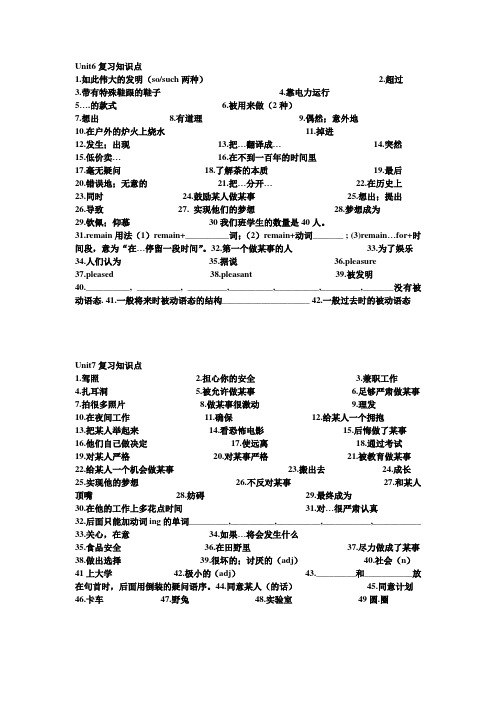
Unit6复习知识点1.如此伟大的发明(so/such两种)2.超过3.带有特殊鞋跟的鞋子4.靠电力运行5….的款式 6.被用来做(2种)7.想出8.有道理9.偶然;意外地10.在户外的炉火上烧水11.掉进12.发生;出现13.把…翻译成…14.突然15.低价卖…16.在不到一百年的时间里17.毫无疑问18.了解茶的本质19.最后20.错误地;无意的21.把…分开…22.在历史上23.同时24.鼓励某人做某事25.想出;提出26.导致27. 实现他们的梦想28.梦想成为29.钦佩;仰慕30我们班学生的数量是40人。
31.remain用法(1)remain+__________词;(2)remain+动词_______ ; (3)remain…for+时间段,意为“在…停留一段时间”。
32.第一个做某事的人33.为了娱乐34.人们认为35.据说36.pleasure37.pleased 38.pleasant 39.被发明40.__________, __________, _________,__________,__________,_________,_______没有被动语态. 41.一般将来时被动语态的结构____________________ 42.一般过去时的被动语态Unit7复习知识点1.驾照2.担心你的安全3.兼职工作4.扎耳洞5.被允许做某事6.足够严肃做某事7.拍很多照片8.做某事很激动9.理发10.在夜间工作11.确保12.给某人一个拥抱13.把某人举起来14.看恐怖电影15.后悔做了某事16.他们自己做决定17.使远离18.通过考试19.对某人严格20.对某事严格21.被教育做某事22.给某人一个机会做某事23.搬出去24.成长25.实现他的梦想26.不反对某事27.和某人顶嘴28.妨碍29.最终成为30.在他的工作上多花点时间31.对…很严肃认真32.后面只能加动词ing的单词_________,__________,__________,___________,___________33.关心,在意34.如果…将会发生什么35.食品安全36.在田野里37.尽力做成了某事38.做出选择39.很坏的;讨厌的(adj)40.社会(n)41上大学42.极小的(adj)43._________和___________放在句首时,后面用倒装的疑问语序。
六年级unit6知识点

六年级unit6知识点六年级Unit 6通常围绕一个特定的主题展开,例如“动物”、“节日”或“旅行”等。
这里我将提供一个关于“动物”主题的知识点内容,供六年级学生学习。
六年级Unit 6:动物世界一、词汇学习1. 动物名称:elephant(大象)、tiger(老虎)、lion(狮子)、monkey(猴子)、panda(熊猫)等。
2. 形容词:big(大的)、small(小的)、cute(可爱的)、dangerous(危险的)等。
3. 动词:eat(吃)、sleep(睡觉)、run(跑)、jump(跳)等。
4. 地点:zoo(动物园)、forest(森林)、savannah(草原)等。
二、语法要点1. 现在进行时:用来描述正在进行的动作,结构为be动词(am/is/are)+动词的现在分词(-ing形式)。
- 例如:The monkey is eating a banana.(猴子正在吃香蕉。
)2. 形容词比较级:用来比较两者之间的差异,通常在形容词后加-er。
- 例如:The elephant is bigger than the monkey.(大象比猴子大。
)3. 一般疑问句:询问信息是否属实,通常以be动词、助动词或情态动词开头。
- 例如:Is the tiger dangerous?(老虎危险吗?)三、日常对话- 询问动物特征:- A: What does the lion look like?(狮子长什么样?)- B: It has a big head and sharp teeth.(它有一个大头和锋利的牙齿。
)- 表达喜好:- A: Do you like pandas?(你喜欢熊猫吗?)- B: Yes, they are very cute.(是的,它们非常可爱。
)四、阅读理解阅读关于不同动物的短文,理解动物的习性、生活环境和保护情况。
例如:In the forest, there are many animals. Tigers live in the dense trees and hunt for food. Pandas are known for their love of bamboo and are often seen eating it. Elephants are the largest land animals and are known for their long trunks and big ears.五、写作练习写一篇关于你最喜欢的动物的短文,描述它的外观、习性和为什么你喜欢它。
Unit 6 (单元复习课件)-七年级英语上册(人教新目标Go for it!)

➢ 三单:Does+主语+like+宾语? Yes,主语代词 does./No,主语代词
doesn’t. John喜欢他们吗?不,他不喜欢。 _D_o_es_ _J_o_h_n_li_k_e_t_h_em_ _?_ N_ _o_,_h_e_ d_o_e_s_n_’_t._ _ _ _ _ _ _ _ _ _ _ _ _
那么;所以,如此的____s_o________ 早餐___b__re__a_k_fa__st______ 作为早餐__fo__r_b__r_e_a__k_f_a_st 午餐___lu_n__c_h______ 午餐后_a_f_t_e_r_l_u_n_c_h____ 明星;星星 ___s_t_a_r_______
11. 晚餐后
____a_ft_e_r_d_i_n_n_e_r___
12. 我不想变胖。_I_d__o_n_’t_w__a_n_t_t_o_b_e__fa_t_._
03 Sentences
Sentences
Jack: Hey, John’s birthday dinner is next week. Let’s think about the food.
Cindy: I love fruit. I think it's healthy.
某人某餐喜欢吃什么?
David: OK. So what fruit do you like? Do you like bananas? 你喜欢吃什么水果?
Cindy: Well, I don't like bananas. But I like oranges and apples.
unit6复习

Unit61.我喜欢可以随着跳舞的音乐。
I like music that I can dance to.1)我喜欢穿起来舒服的鞋子/戴起来舒服的帽子。
I like shoes/hats that are comfortable to wear.2)我喜欢不太贵的餐馆。
I like restaurants that are not too expensive.3)我喜欢十分美味的零食。
I like snacks that are really delicious.= I like delicious snacks.…4)我喜欢不太热的天气。
I like weather that isn’t too hot.= I don’t like/I dislike very hot weather.5)Carmen喜欢自己写歌的音乐家。
Carmen likes musicians whowrite their own songs.6)我更喜欢歌词很棒的音乐。
I prefer music that has great lyrics.2.prefer更喜爱;更喜欢1)prefer sth.2)prefer A to B:喜欢A胜过B喜欢doing 胜过doing Eg: 我喜欢古典乐胜过流行乐。
I prefer classical music to pop music.3)prefer to do…rather thando…= would rather do than do 4)prefer doing/ to do3.随着音乐唱歌/跳舞dance to musicsing along with music4.,5.安静轻柔的曲子quiet and gentle songs6.提醒某人某事/让某人想起某事remind sb. of sth.这音乐让我想起巴西舞曲。
The music remind s me of Brazilian dance music.7.你不喜欢这张CD的什么What do you dislike about this CD8.sing the words clearly清晰的唱出歌词?Some of the singers don’tsing the words clearly.9.be like 像……这音乐像巴西舞曲。
Unit6AnUnusualDay复习提纲(知识清单)-闽教版英语六年级上册

He had some cake and milk in the taxi.
他在出租车里吃了一些蛋糕和牛奶。
yesterday afternoon
昨天下午
do some shopping
购物
at the supermarket
在超市
at theyed
playing
一般现在时:一般现在时表示经常性、规律性、习惯性的状态或者动作。如:每天起床、吃饭、上学,一个星期去几次超市等。这个动作经常发生,是一般的情况,而不是具体的某一次。
关键词:always,usually,often,sometimes,every+时间词等。
晚的;迟到
when
什么时候
get up
起床
get up late
晚起
get up early
早起
at +时间点
在......
half past+数字
...点半
half past eleven=eleven thirty
十一点半
this morning
今天早上
an hour
half an hour
一个小时
他通常六点半起床。
But this morning he got up at half past seven.
但是今天早上他七点半起床。
He usually walks to school.
他通常走路去上学。
=He usually goes to school on foot.
他通常走路去上学。
But this morning he took a taxi.
Unit6 知识梳理
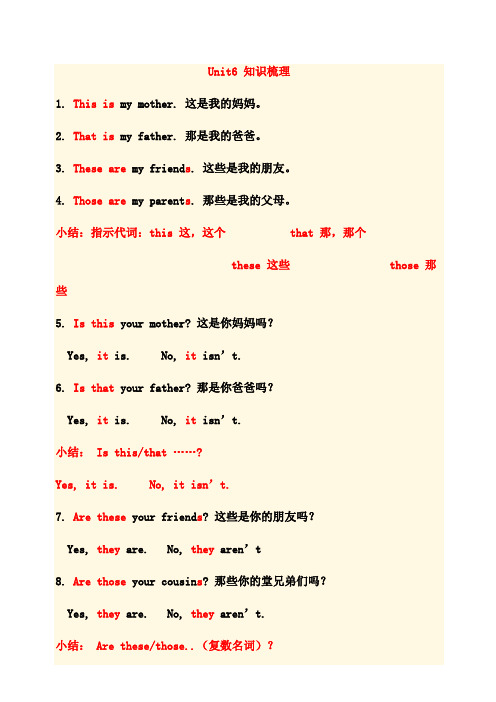
Unit6 知识梳理1. This is my mother. 这是我的妈妈。
2. That is my father. 那是我的爸爸。
3. These are my friend s. 这些是我的朋友。
4. Those are my parent s. 那些是我的父母。
小结:指示代词:this 这,这个 that 那,那个 these 这些 those 那些5. Is this your mother? 这是你妈妈吗?Yes, it is. No, it isn’t.6. Is that your father? 那是你爸爸吗?Yes, it is. No, it isn’t.小结:Is this/that ……?Yes, it is. No, it isn’t.7. Are these your friend s? 这些是你的朋友吗?Yes, they are. No, they aren’t8. Are those your cousin s? 那些你的堂兄弟们吗? Yes, they are. No, they aren’t.小结: Are these/those..(复数名词)?Yes, they are. No, they aren’t.9. Is Mary your sister? 玛丽是你的姐姐吗?Yes, she is. No, she isn’t.10. Is Tom your brother? 汤姆是你的弟弟吗?Yes, he is. No, he isn’t.11. Is he your brother? 它是你的哥哥吗?Yes, he is. No, he isn’t.12. Is she your sister? 她是你的妹妹吗?Yes, she is. No, she isn’t.13. Are they your friend s? 他们是你的朋友吗?Yes, they are. No, they aren’t.同学们:你们能自己总结规律吗?14. Thanks for the photo of your family photo.感谢你的家庭照① thanks for…=thank you for …因为…而感谢eg: Thanks for your help.感谢你的帮助。
Unit 6 知识归纳
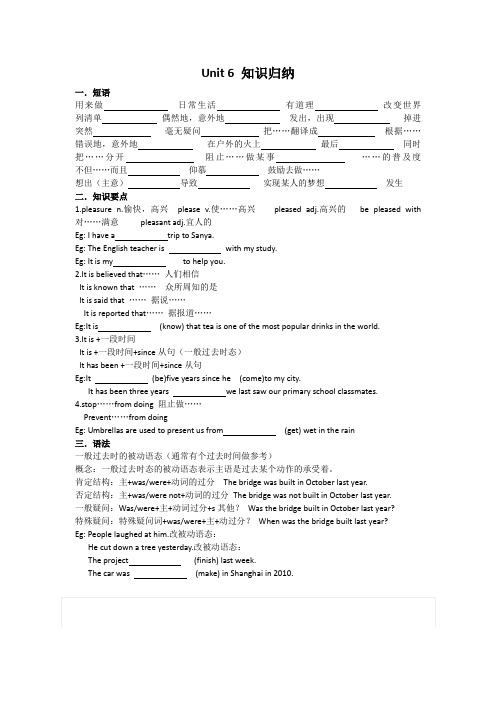
Unit 6 知识归纳一.短语用来做日常生活有道理改变世界列清单偶然地,意外地发出,出现掉进突然毫无疑问把……翻译成根据……错误地,意外地在户外的火上最后同时把……分开阻止……做某事……的普及度不但……而且仰慕鼓励去做……想出(主意)导致实现某人的梦想发生二.知识要点1.pleasure n.愉快,高兴please v.使……高兴pleased adj.高兴的be pleased with 对……满意pleasant adj.宜人的Eg: I have a trip to Sanya.Eg: The English teacher is with my study.Eg: It is my to help you.2.It is believed that……人们相信It is known that ……众所周知的是It is said that ……据说……It is reported that……据报道……Eg:It is (know) that tea is one of the most popular drinks in the world.3.It is +一段时间It is +一段时间+since从句(一般过去时态)It has been +一段时间+since从句Eg:It (be)five years since he (come)to my city.It has been three years we last saw our primary school classmates.4.stop……from doing 阻止做……Prevent……from doingEg: Umbrellas are used to present us from (get) wet in the rain三.语法一般过去时的被动语态(通常有个过去时间做参考)概念:一般过去时态的被动语态表示主语是过去某个动作的承受着。
Unit6复习要点
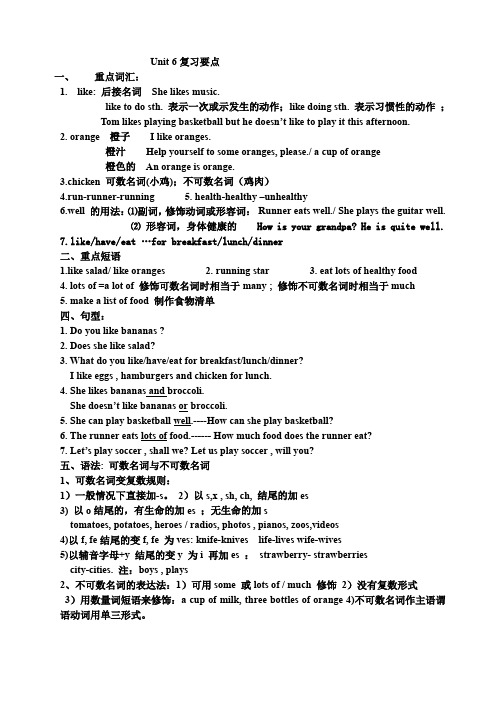
Unit 6复习要点一、重点词汇:1.like: 后接名词She likes music.like to do sth. 表示一次或示发生的动作;like doing sth. 表示习惯性的动作;Tom likes playing basketball but he doesn’t like to play it this afternoon.2. orange 橙子I like oranges.橙汁Help yourself to some oranges, please./ a cup of orange橙色的An orange is orange.3.chicken 可数名词(小鸡);不可数名词(鸡肉)4.run-runner-running5. health-healthy –unhealthy6.well 的用法:⑴副词,修饰动词或形容词:Runner eats well./ She plays the guitar well.⑵形容词,身体健康的 How is your grandpa? He is quite well.7.like/have/eat …for breakfast/lunch/dinner二、重点短语1.like salad/ like oranges2. running star3. eat lots of healthy food4. lots of =a lot of 修饰可数名词时相当于many ; 修饰不可数名词时相当于much5. make a list of food 制作食物清单四、句型:1. Do you like bananas ?2. Does she like salad?3. What do you like/have/eat for breakfast/lunch/dinner?I like eggs , hamburgers and chicken for lunch.4. She likes bananas and broccoli.She doesn’t like bananas or broccoli.5. She can play basketball well.----How can she play basketball?6. The runner eats lots of food.------ How much food does the runner eat?7. Let’s play soccer , shall we? Let us play soccer , will you?五、语法: 可数名词与不可数名词1、可数名词变复数规则:1)一般情况下直接加-s。
八年级英语(仁爱版)Unit6重点归纳

八年级英语(仁爱版)Unit6重点归纳英语仁爱版Unit6重点归纳一. 重点词汇( 一 ) 词形转换:1.discuss(v.) discussion(n.)2.queen(对应词) kingfortable(adj.) comfort.(n.)4.safely(adv.) safe (adj.) safety(n.)(二)重点词组:1.go on a visit to 去……旅行2. make the decision 做决定3.bring back 带回4.go on a field trip 去野外旅行5.decideon (upon) sth 对某事做出决定6 see the sunrise 看日出7. my pleasure 不客气 8. come up with 想出(主意)9.look forward to (doing) sth 期望10. S人+pay for支付;赔偿 11. raise money 筹钱 12.some places of interest 名胜13. make a room for sb 为……订房间14.have a wonderful time 玩得愉快15. in the daytime 在白天16. a two-day visit 为期两天的旅行17.find out 查出,找出二.重点句型及重点语言点1. I have some exciting news to tell you. 我有一些激动人心的消息要告诉你们。
to tell you 是动词不定式短语,作定语。
动词不定式作定语时常放在被修饰的名词或代词之后。
如: I havenothing to talk about. He has a lot of work to do.2. Sounds great!= It sounds great! 听起来不错。
3. We will go on a two-day visit to Mount Tai. 我们将要去泰山玩两天。
Unit6复习课件 人教版八年级英语下册

单词拓展根据提示写出下列单词的变换形式1.gold n.金子; 金币 adj.金色的→ adj.金色的;金黄色的2. wife n.妻子;太 太→ (复数)3. lead v.带路;领路→ (过去式)→ n.领导 ;领袖4. brave adj.勇敢的;无畏的→ adv.勇敢地5. shine v. 发光;照耀→ (过去式)→ (现在分词)
1. so moved;take;away 2. It doesn't seem very possible to 3. This is because;turning;into
4. But he can hide his tail, he cannot himself a man.但是他不能把自己变成人,除非他能把尾巴藏起水。5. The new couple were happy they____ _____ _____when they _____ _____.
15.在其他时候
16.对某事有不同的观点
17.同意某人(的观点)
18.第一次
19.主要人物
20.确切地说;事实上;实际上
21.把某物放在······里面
22.看起来像
23.对······感兴趣
24.出版;发
行
27.从前
28.爱上
152.9a.t结ot婚her times 16. have different opinions about sth.17. agree with
sb.18. for the first time 19. the main character 20. in fact
21. keep sth. in……22. look like23. become interested in…24. come out 25. for many years
Unit6 复习要点(PEP版)

Unit6 复习要点(pEp版)一、单词1.表示感觉或者心情的单词:angry生气afraid害怕happy开心→(反义词)sad伤心unhappy不开心2.动词短语:see a doctor看病wear warm clothes 穿暖和的衣服take a deep breath 深深吸一口气count to ten 数到十do more exercise 做更多的运动3.其他单词及考点:chase追赶→(现在分词)chasing mouse老鼠→(复数)micebad坏的→(反义词)good hurt(使)受伤ill有病;不舒服wrong 有毛病(wrong还有“错误的”意思,→(反义词)right)should应该(后+动词原形)feel 觉得,感到well 健康;身体好grass草坪hear听见→(同音词)here 这里an ant 一只蚂蚁will not→(缩写)won’t (后面+动词原形)二、句型1. How do you feel? 你感觉怎么样?= How are you feeling?2. Let’s have some popcorn. 让我们吃些爆米花吧。
3. I’ll go and get some drinks. 我去拿点喝的。
4. Wait for me! 等我!5. How could you eat all the popcorn?! 你怎么能吃光所有的爆米花呢?6. We should share! 我们应该分享!7. If I feel angry, what should I do?如果我感到生气,我应该做什么?8. After that, you won’t feel so angry. 然后你就不会感到如此生气了。
9.Should I count to ten, too? 我也应该数到十吗?10. What’s (What is) this cartoon about? 这部动画片是关于什么的?11. It’s about a cat. 它是关于一只猫的。
人教版PEP五年级英语上册《Unit6知识点梳理+单元
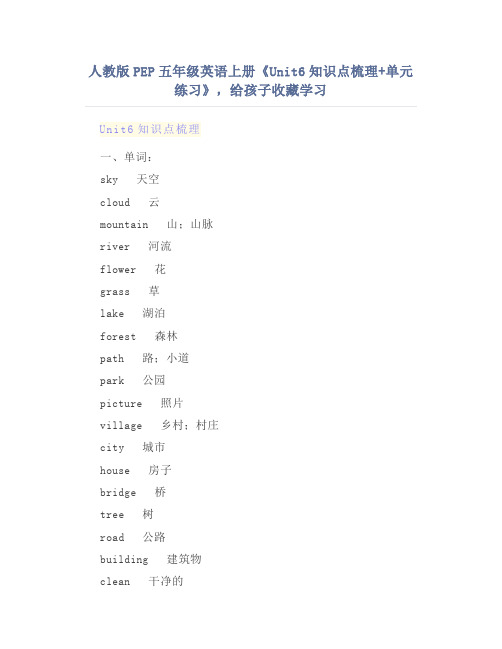
人教版PEP五年级英语上册《Unit6知识点梳理+单元练习》,给孩子收藏学习Unit6知识点梳理一、单词:sky 天空cloud 云mountain 山;山脉river 河流flower 花grass 草lake 湖泊forest 森林path 路;小道park 公园picture 照片village 乡村;村庄city 城市house 房子bridge 桥tree 树road 公路building 建筑物clean 干净的二.句子:1.There is a forest in the nature park.在自然公园里有一个森林。
2. Is there a forest in the park? 公园里面有一个森林吗?------ Yes, there is. 是的,有。
No, there isn’t。
不,没有。
(There be句型的一般疑问句:--- Is / Are there + 某物 + 某地?回答:Yes, there is / are. No, there isn t / aren t. )3. There are many small houses in my village. 在我的村庄里有许多小房子。
4.Are there any pandas in the mountains? 山里有熊猫吗?-----Yes, there are.是的,有/No,therearen’t. 不,没有。
三. 语法:1、There be 的单数形式在变为一般疑问句时,将助动词be提前,与there交换位置,如句中有第一人称代词,变为第二人称,将句末的句号变为问号,其他不变。
第二人称you you you you第三人称he himthey them she herit it人称代词主格作主语,表示动作的发出者。
人称代词宾格作宾语,表示动作行为的对象。
物主代词形容词性物主代词(my/your/his/her/its/our/their)+名词(用于修饰名词)名词性物主代词(mine/yours/his/hers/its/ours/theirs则相当于形容词性物主代词+名词。
八年级UNIT6Unit6 知识梳理复习
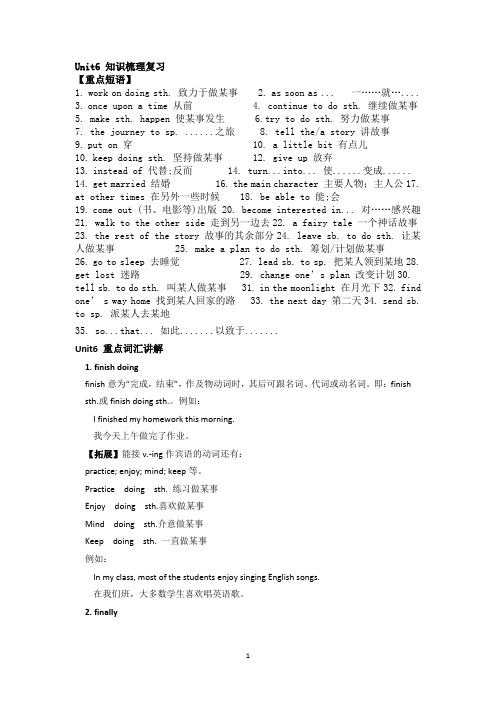
Unit6 知识梳理复习【重点短语】1. work on doing sth. 致力于做某事2. as soon as ... 一……就…....3.once upon a time 从前4. continue to do sth. 继续做某事5. make sth. happen 使某事发生6.try to do sth. 努力做某事7. the journey to sp. ......之旅 8. tell the/a story 讲故事9.put on 穿 10. a little bit 有点儿10.keep doing sth. 坚持做某事 12. give up 放弃13.instead of 代替;反而 14. turn...into... 使......变成......14.get married 结婚 16. the main character 主要人物;主人公17. at other times 在另外一些时候 18. be able to 能;会e out (书、电影等)出版 20. become interested in... 对……感兴趣21. walk to the other side 走到另一边去22. a fairy tale 一个神话故事23. the rest of the story 故事的其余部分24. leave sb. to do sth. 让某人做某事 25. make a plan to do sth. 筹划/计划做某事26.go to sleep 去睡觉 27. lead sb. to sp. 把某人领到某地28. get lost 迷路 29. change one’s plan 改变计划30. tell sb. to do sth. 叫某人做某事 31. in the moonlight 在月光下32. find one’ s way home 找到某人回家的路 33. the next day 第二天34. send sb. to sp. 派某人去某地35. so...that... 如此.......以致于.......Unit6 重点词汇讲解1. finish doingfinish意为“完成,结束”,作及物动词时,其后可跟名词、代词或动名词。
Unit6单元总复习课件

重点表达
课文中出现的与旅游相关的重点词汇和短语,如“旅游景点”、“历史文化”、“自然风光”等。
句型
课文中出现的与旅游相关的句型,如“The Great Wall is one of the most famous tourist attractions in China.”、“The Eiffel Tower is a wrought-iron lattice tower located on the Champ de Mars in Paris, France.”等。
答案解析:答案详见教材,重点考查学生对Unit6知识点的深度理解和创新应用能力。
学习建议与指导
CATALOGUE
06
积极参与课堂讨论,主动提问和回答问题。
定期回顾所学内容,总结重点和难点,以及自己的学习心得。
反思学习
主动学习
合作学习:与同学一起讨论、研究和完成作业,互相学习和借鉴。
笔记整理
及时整理课堂笔记,重点记录老师强调的内容和自己的疑问点。
掌握本单元的核心概念和理论。
理解本单元的重点和难点。
了解本单元与其他单元的联系和区别。
掌握本单元的实践应用和案例分析。
词汇和语法复习
CATALOGUE
02
总结词
掌握常用词汇
详细描述
复习本单元所学的重点词汇,包括单词的拼写、发音和意义,以及词汇的词性、用法和搭配。通过例句和练习题加深对词汇的理解和记忆。
介绍了不同国家和地区的旅游文化背景,包括当地的历史、民俗、美食等。
文化背景
课文中涉及到的地理、历史、文化等方面的知识点,如不同国家和地区的首都、历史事件、文化传统等。
知识点
练习与巩固
七年级英语unit六知识点归纳

七年级英语unit六知识点归纳Unit 6: Hobbies七年级英语unit六知识点归纳Unit 6 focuses on hobbies, leisure activities that individuals enjoy doing in their free time. In this unit, students will learn how to talk about their hobbies, express preferences, and share experiences with others. Here are some of the key points covered in Unit 6:1. VocabularyIn this unit, students will learn new vocabulary related to hobbies. They will learn words such as "collect," "paint," "play music," and "watch movies." It is essential to memorize these words and understand their meanings to communicate effectively about hobbies.2. Verb + -ingStudents will learn how to use the verb + -ing structure to describe their hobbies. For example, "I enjoy swimming" or "She hates shopping." Through practice, students can master verb + -ing easily.3. Expressing preferencesIn Unit 6, students will learn how to express their preferences in hobbies. They will learn phrases such as "I prefer playing soccer to watching TV" or "He likes swimming more than dancing." It is essential to learn these phrases to express opinions about hobbies.4. Adverbs of frequencyAdverbs of frequency, such as "always," "usually," and "never," are introduced in this unit. Students will learn how to use these adverbs to talk about how often they do an activity. For example, "I always play basketball on weekends" or "I never watch horror movies." It is essential to use adverbs of frequency correctly to communicate accurately.5. Listening and speakingIn this unit, students will listen to conversations about hobbies and answer questions. They will also practice speaking about their hobbies, sharing experiences, and expressing opinions. Through this practice, students can improve their listening and speaking skills.6. WritingStudents will also learn how to write a short paragraph about their hobbies. They will learn how to organize their ideas and use the correct vocabulary and grammar to express themselves clearly. Practicing writing in English can improve vocabulary, grammar, and overall language skills.In conclusion, Unit 6 focuses on hobbies and leisure activities. By learning new vocabulary, grammar structures, and expressions related to hobbies, students can communicate fluently and effectively in English. Regular practice of listening, speaking, and writing about hobbies can improve language skills and enrich the learning experience.。
人教版PEP六年级英语上册《Unit6知识点梳理+单元

人教版PEP六年级英语上册《Unit6知识点梳理+单元练习》,给孩子收藏学习Unit6知识点梳理一、重点短语与单词rain雨cloud云sun太阳stream小溪come from来自seed种子soil土壤sprout嫩芽plant植物,种植二、重点句型:1.Where does the rain come from?雨来自哪?2.It comes from the clouds. 它来自云。
3.How do you do that?你是怎么做的?4.What should you do then?然后你应做什么?三、重点语法:1、名词变形容词:rain-rainy cloud -cloudy wind-windy sun-sunnysnow- snowy2、We can see water inthesea/river/lake/stream/rain/snow3、注意表示顺序的词:first 首先, then然后,next 接下去4、记住第71页的水循环的图和72页的过程。
5、注意几对来自:wheat----flour---breadsheep--- mutton apple----apple juice pig---pork cow----milk6、注意植物的生长顺序,有可能考到排列顺序题P736、should 是情态动词,后面加动词的原形。
文化知识点:水在不同的温度下有三种状态 ice water vapourUnit6单元练习一、根据要求完成单词。
(共1题;共8分)(1)fly (三单) ________(2)studies (原形) ________(3)here (同音词) ________(4)also (同义词) ________(5)those (单数形式) ________(6)long (对应词) ________(7)child (复数形式) ________(8)happy (对应词) ________二、选出不同类的单词。
- 1、下载文档前请自行甄别文档内容的完整性,平台不提供额外的编辑、内容补充、找答案等附加服务。
- 2、"仅部分预览"的文档,不可在线预览部分如存在完整性等问题,可反馈申请退款(可完整预览的文档不适用该条件!)。
- 3、如文档侵犯您的权益,请联系客服反馈,我们会尽快为您处理(人工客服工作时间:9:00-18:30)。
__________________ __________________ __________________ __________________
11. 分开; 分散(v. )
12. 篮; 筐(n. ) 13. electric(adj. ) 答案: 7. smell 10. sour 8. translate
答案: What; used for; is used for
Ⅴ. 真题体验 1. (2013· 贵港中考 )He is a blind boy, but he can look after his__________ (日常的)life.
2. (2013· 杭州中考)I came to the city two years ago. I’ve worked
_________________________________________________
9. (2013· 宜宾中考)据报道约200人在芦山地震中丧生。 It__________ __________ that about 200 people had lost their lives in Lushan earthquake. 答案: 7. Can you tell me when the telephone was invented? 8. The child was finally found, safe and well. 9. was reported
→__________ (adj. )加拿大的
→__________ (n. )受欢迎; 普及 →__________ (adj. )职业的 15. daily 16. national 17. salty
19. popularity
20. professional
Ⅱ. 短语互译
1. 偶然; 意外地
点拨提升
• 一般过去式的被动语态:
• • • • 1.肯定句:主语+was/were +过去分词 2. 否定句:主语+was/ were +not +过去分词 3. 一般疑问句:was/ were+主语+过去分词 4. 特殊疑问句:特殊疑问词+was/were+过去分词
生活启示录—— 例文
• I think (that) some inventions in our life are useful such as zipper, website and fridge. • Zipper was invented by Whitcomb Judson in 1893. we can see zippers on dresses, trousers, shoes, bags… • It is very convenient to search for information on websites. You can find almost everything you want to know. • Fridge is used to keep the things fresh, especially food. I think (that) it is one of the greatest inventions in the world.
3:00—3:30 抄写范文并背诵;抄写Unit6短 语,grammar focus 1遍在writing本上,并 背诵黑体单词,短语,grammar focus并诵 读课文3遍。 3:30—3:35小组接龙
【九年级 听力 单项选择(共10小题,计10分) 三、完型填空。 四、阅读理解。 五. 单词拼写(共10小题,计10分) 根据句意及汉语提示,填写句中所缺的单词。 六. 根据短文内容,用括号内所给动词的适当形式填空,必要 时可加助动词或情态动词。(10分) 七、英汉互译(共5小题,计5分)将下列汉语句子译成英语, 英语句子译成汉语。翻译整个句子 八. 任务型阅读(共5小题,计5分)五选五 九、书面表达】
16. nation(n. ) 17. salt(n. )
→__________ (adj. )每日的; 日常的
→__________ (adj. )国家的; 民族的 →__________ (adj. )咸的
18. Canada(n. )
19. popular(adj. ) 20. profession(n. ) 答案: 14. pleasure 18. Canadian
here for n__________ two years. 3. (2013·宁 波 中 考 )The meat is producing a terrible
s__________ . Throw it away!
答案: 1. daily 2. nearly 3. smell
4. (2013·安 徽 中 考 )Would you please make a shopping l__________ (清单)for the picture? 5. (2013· 扬州中考)The novel was later__________ into a play. (make) 6. (2013· 盐城中考)What do you think is the greatest__________
__________________
__________________ →__________ (n. )电; 电能 9. instrument 13. electricity
11. divide
12. basket
14. please(v. )
→__________ (n. )高兴; 愉快
15. day(n. )
Ⅰ. 词汇速记 1. 样式; 款式(n. ) 2. 网站(n. ) 3. 先锋; 先驱(n. ) 4. 提到; 说到(v. ) __________________ __________________ __________________ __________________
5. 几乎; 差不多(adv. )
10. (2013· 遂宁中考)我们被分成四组做实验。
We are__________ __________ four groups to do the experiment. 11. (2013· 黄石中考)抱歉, 我错拿了你的包。 Sorry, I took your bag__________ __________ . 12. (2013· 广州中考)在中国到处都有人打羽毛球。 In China, badminton__________ __________ everywhere. 答案: 10. divided into 11. by mistake
Ⅲ. 句型攻关
1. ——这个图书馆是什么时候建造的?
—When__________ the library__________ ? ——它是2008年建造的。
—It__________ __________ __________ 2008.
2. ——这棵树是谁栽的? —__________ __________ the tree__________ by? ——它是我妈妈栽的。 —It__________ __________ __________ my mother.
(invent) of the twentieth century?
答案: 4. list 5. made 6. invention
7. (2013· 威海中考)你能告诉我电话是什么时候发明的吗? _________________________________________________ 8. (2013· 苏州中考)小孩最终被找到了, 安然无恙。
答案: 1. was; built; was built in
planted by
2. Who was; planted; was
3. ——这个杯子是用来干什么的? —__________ is the cup__________ __________ ? ——它是用来喝茶的。 —It__________ __________ __________ drinking tea.
生活启示录—— 例文
• I think __________________________________ such as zipper, website and fridge. • Zipper ________________Whitcomb Judson in 1893. we can see zippers _______________… • __________________________ on websites. You can find almost everything _______________. • Fridge ___________________, especially food. I ______________________________ in the world.
6. 保持不变; 剩余(v. ) 答案: 1. style 2. website
__________________
__________________ 3. pioneer 4. mention
5. nearly
6. remain
7. 气味(n. ) 8. 翻译(v. ) 9. 器械; 仪器(n. ) 10. 酸的; 有酸味的(adj. )
2d: 1.my pleasure别客气 2.such a great invention如此伟 大的发明 3.in our daily lives在我们日常的生活中4.have a point有道理 5.be used for被用来作…6.for example 例如 3a: 1.by accident偶然的 2. take place发生 3.without doubt毫无疑问 4.all of a sudden突5.tranlate…into… 把…译成 6.make tea沏茶 7.It’s said that…据说 8.without doubt毫无疑问 2b: 1.by mistake错误地 2.divide…into把…分成…3.at the same time与此同时 4.stop…from阻止 5.look up to钦 佩6.be used for被用作…7.dream of梦想 8.the number of..的数量 9.encourage sb. to do鼓励某人做某事
